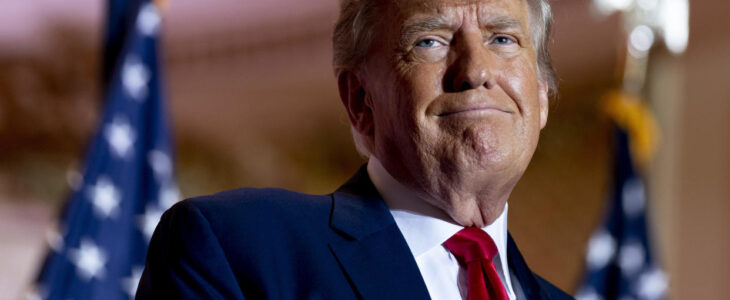
Donald Trump has been indicted by a Manhattan grand jury, a historic reckoning after years of investigations into his personal, political and business dealings and an abrupt jolt to his bid to retake the White House.
The exact nature of the charges was unclear Friday because the indictment remained under seal, but they stem from payments made during the 2016 presidential campaign to silence claims of an extramarital sexual encounter. Prosecutors said they were working to coordinate Trump’s surrender, which could happen early next week. They did not say whether they intended to seek prison time in the event of a conviction, a development that wouldn’t prevent Trump from seeking and assuming the presidency.

The indictment, the first against a former U.S. president, injects a local district attorney’s office into the heart of a national presidential race and ushers in criminal proceedings in a city that the ex-president for decades called home. Arriving at a time of deep political divisions, the charges are likely to reinforce rather than reshape dueling perspectives of those who see accountability as long overdue and those who, like Trump, feel the Republican is being targeted for political purposes by a Democratic prosecutor.
Trump, who has denied any wrongdoing and has repeatedly assailed the investigation, called the indictment “political persecution” and predicted it would damage Democrats in 2024. In a statement confirming the charges, defense lawyers Susan Necheles and Joseph Tacopina said Trump “did not commit any crime. We will vigorously fight this political prosecution in court.”

A spokesman for the Manhattan district attorney’s office confirmed the indictment and said prosecutors had reached out to Trump’s defense team to coordinate a surrender. Tacopina said Trump is “likely” to turn himself in on Tuesday.
Trump was asked to surrender Friday but his lawyers said the Secret Service needed additional time as they made security preparations, two people familiar with the matter told The Associated Press. The people spoke on condition of anonymity because they couldn’t publicly discuss security details.
Trump was implicated in court filings as having knowledge of the arrangements — obliquely referred to in charging documents as “Individual 1” — but U.S. prosecutors at the time balked at bringing charges against him. The Justice Department has a longtime policy against indicting a sitting president in federal court.
Bragg’s predecessor as district attorney, Cyrus Vance Jr., then took up the investigation in 2019. While that probe initially focused on the hush money payments, Vance’s prosecutors moved on to other matters, including an examination of Trump’s business dealings and tax strategies.
Vance ultimately charged the Trump Organization and its chief financial officer with tax fraud related to fringe benefits paid to some of the company’s top executives.
The hush money matter became known around the D.A.’s office as the “zombie case,” with prosecutors revisiting it periodically but never opting to bring charges.
Bragg saw it differently. After the Trump Organization was convicted on the tax fraud charges in December, he brought fresh eyes to the well-worn case, hiring longtime white-collar prosecutor Matthew Colangelo to oversee the probe and convening a new grand jury.
Cohen became a key witness, meeting with prosecutors nearly two-dozen times, turning over emails, recordings and other evidence and testifying before the grand jury.
Trump has long decried the Manhattan investigation as “the greatest witch hunt in history.” He has also lashed out at Bragg, calling the prosecutor, who is Black, racist against white people.
The criminal charges in New York are the latest salvo in a profound schism between Trump and his hometown — a reckoning for a one-time favorite son who grew rich and famous building skyscrapers, hobnobbing with celebrities and gracing the pages of the city’s gossip press.
Trump, who famously riffed in 2016 that he “could stand in the middle of Fifth Avenue and shoot somebody” and “wouldn’t lose voters,” now faces a threat to his liberty in a borough where more than 75% of voters — many of them potential jurors — went against him in the last election.
Credit: Yahoo News
